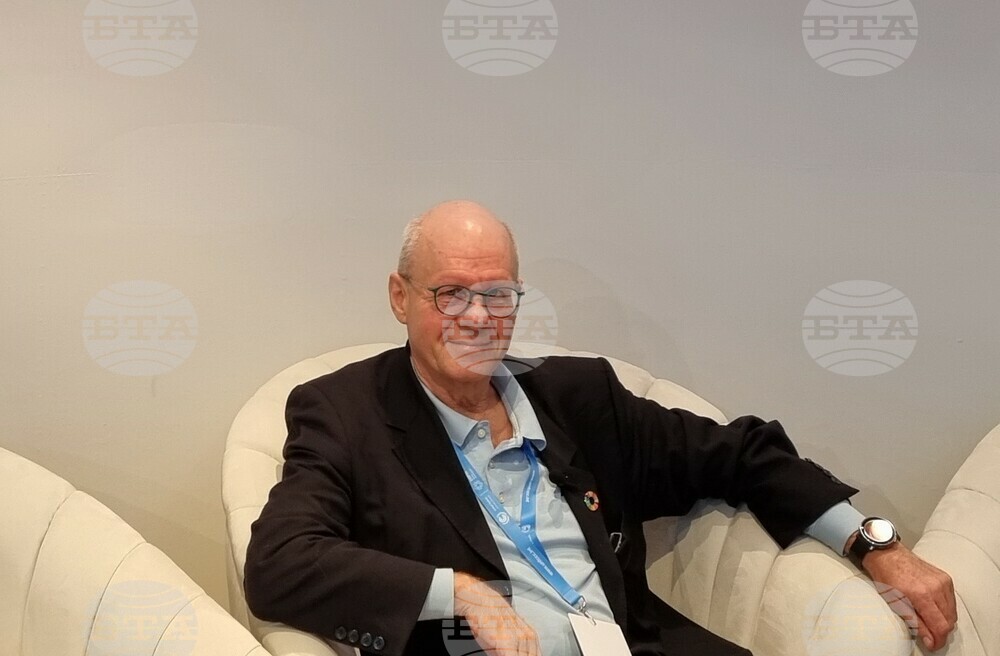site.btaPeter Schmidt: Europe Is Keeping Its Leadership in Global Green Transition


Europe is keeping its leadership in the green transition and this can be seen at COP29 in Baku, Peter Schmidt, head of the European Economic and Social Committee (EESC) delegation to the summit in Baku said in a BTA interview.
BTA spoke to him two days before the end of the forum, when there were not yet even draft documents on the main issues of this year's climate conference, referred to as the "financial COP" because of expectations for clear commitments on financing the green transition.
"The EESC is not part of the COP29 negotiations, but our delegation is here and we are trying to find out how the negotiations are going. We are trying to connect the dots, we are communicating as EU civil society representatives with other civil society representatives here and we are trying to get the EESC's messages across. In this sense, we are also trying to support our allies in their actions," Schmidt said.
"So far, it seems that it is still difficult to reach an agreement on the finance needed for climate action. This is important not only from a European perspective, but also from the perspective of the global South. If we do not show more solidarity with the global South, it will be difficult. There have been some encouraging messages this week from Brazil (where the G20 meeting was held) There have been decisions on several steps in terms of what is needed to activate mitigation and adaptation funds and compensation. All this can be used here and obviously by the end of COP29 there can be progress and it is likely that these issues will be finalized in Brazil, at the next COP", Schmidt predicted.
He explained that European civil society organizations can help in this process by establishing ties and sharing the European position. "There are nuances, of course, our partners think we could set more ambitious goals. Europe is among the biggest donors, but the distribution of funds could be better - to vulnerable groups and countries. So one way we can help in the EU negotiations is by discussing the issues with the other delegations of the COP29. This we can do, although it is limited. But it is important for us to get in touch with civil society organizations from the global South and with organizations that are part of the transition," he explained.
Responding to a question on whether there has been some retreat from the EU's ambitious green transition goals following the European Parliament elections in the summer, Schmidt was adamant that Europe remains a leader in the green transition.
"In Europe, in the European Parliament, probably yes. But here, at the COP, my feeling is not like that. You can see that Europe still has big ambitions, and that makes me happy, because the fear was that in the election campaign the sceptics and the global warming deniers took up more space. But we see that this has no impact on the negotiations here. We see that Europe is in the lead, which is what we are demanding, and that there is no retreat from its leadership. This is extremely important, because we have felt it in our recent missions - in Cali, Colombia, and in New York at the Summit for the Future and at the High-Level Political Forum. There, it was evident that the rest of the world is hopeful, because Europe retains its leading position in these movements. Obviously, the political sentiment has not changed the European position. This is even more important after the US presidential elections, Europe has a chance to be in an even stronger global leadership position."
Schmidt also commented on the recommendations in Mario Draghi's report on the European economy and the transition to zero pollution. "Mario Draghi's report is very clear in this respect. It is not just about competitiveness. It is important which group's voice we listen to when we read this report. A part of them say that this report is only about competitiveness. However, from our point of view, competitiveness means much more than just dabbling in an economy that is not sustainable. Draghi does not say that in his report. He is saying that we must increase our investment and continue to have a competitive economy that is in line with the green objectives. So his recommendations are not at odds with what is happening on SGP29. Draghi says simply - do more. That should be the guiding principle for the people we talked about who got more visibility before the election. They are saying that we should make less effort in the green transition, but that is not what Draghi is saying. He is saying that we need to do even more so that we don't lose our competitiveness," Schmidt said.
Peter Schmidt is union secretary for international and European affairs at the German Food, Drink and Catering Workers' Union. He is Germany's representative in EESC Group II (Workers), chair of the Agriculture, Rural Development and Environment section and chair of the Parties group to the UN Framework Convention on Climate Change.
The EESC is an EU advisory body that supports the work of the European Parliament, the Council of the EU and the European Commission. Its members are employers, trade unionists and representatives of social, professional, economic and cultural organizations.
/PP/
news.modal.header
news.modal.text